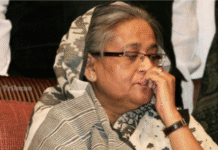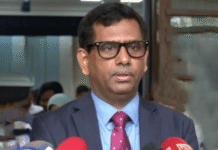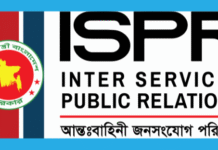By Jesmin Papri on Apr 01, 2020
Global rights watchdog Amnesty International called on Bangladeshi police Wednesday to locate a newspaper editor who reportedly went missing weeks ago, just hours before authorities filed a second case in which they accused him of violating the Digital Security Act (DSA).
Shafiqul Islam Kajol was seen on a closed-circuit camera shortly before 7 p.m. on March 10 as he rode a motorbike from his office at the Daily Pokkhokal newspaper. One day earlier, ruling Awami League lawmaker Saifuzzaman Shikhor had filed a case under the act against Kajol and 31 others.
About three hours after Kajol was last seen, police registered a new case against him under the DSA, filed by Awami party member Usmin Ara Bailey. It accused Kajol of committing “extortion” by “obtaining information illegally” and publishing “false, intimidating and defamatory” information on Facebook and Messenger, Amnesty said in a model letter for supporters to send to government officials.
“Police [have] denied having him in custody, but his family fears he could be a victim of enforced disappearance. Bangladesh authorities have an obligation under the Constitution that ‘no person shall be deprived of life or personal liberty save in accordance with the law,’” Amnesty International said.
The DSA, which went into effect in September 2018, includes harsh prison sentences for online defamation, insulting a person’s religion and other offenses. Critics have complained that it is an impediment to free speech.
Family: ‘We even fear to walk alone’
Kajol’s son, Monorom Polok, told BenarNews that his family learned about the second charge from an Amnesty statement.
“There has been no progress in finding my father even after many days have passed. We don’t see any sign that (police) are trying at all,” he said.
Polok, a public university student, said his entire family felt insecure.
“We even fear to walk alone. My father is a journalist by profession, many people know him. If this is a consequence for my father, can you imagine what will happen in our case,” he said.
The officer in charge at the Hazaribagh police station acknowledged that the second charge had been filed against Kajol, but it was transferred to the Dhaka Metro Police cybercrimes unit.
“Now they are investigating the case,” Ikram Ali Miah told BenarNews.
The original case was filed in Chawkbazar, another district of Dhaka.
Chawkbazar station officer in charge Moudud Hawlader said officers had been in touch with Kajol’s family.
“Our contact numbers are available to them. They can communicate with us if they feel any kind of insecurity or discomfort,” he told BenarNews.
In addition, investigators have tried to locate the missing journalist.
“We have video footage on his last location. There have been efforts to find more videos,” Hawlader said, adding that efforts were hampered by the shutdown stemming from the coronavirus outbreak.
Meanwhile, Human Rights Watch joined Amnesty in expressing concern that Kajol could be a victim of enforced disappearance involving security forces.
“Bangladeshis should not live in fear of abduction if they share something on Facebook,” Brad Adams, the Asia director for HRW, said in a March 13 news release. “The government needs to seriously investigate the many cases in which family members allege that the victim was picked up by security forces but whose whereabouts remain unknown.”
Hawlader, the police officer, responded to the human rights groups’ concerns.
“We are not sure what happened. Our efforts to locate him will continue,” he said.










